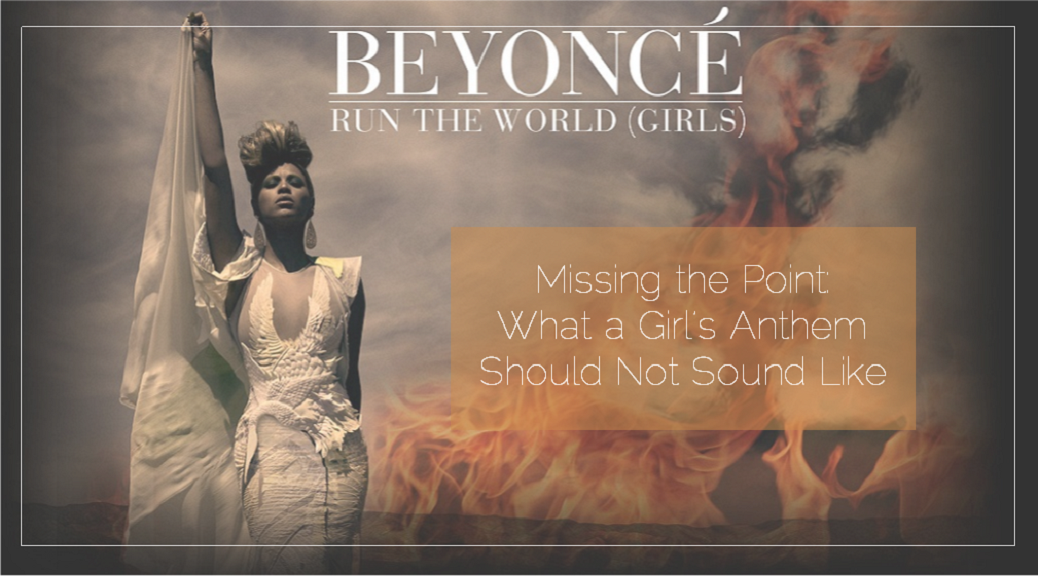The title seems harsh, doesn’t it? I know that this the post might get my inbox filled with emails from irate Beyoncé fans, but her song “Run the World (Girls)” still is, in my opinion, part of a series of popular girl’s anthems gone wrong.
It doesn’t mean that I don’t appreciate the song. Quite the contrary, I love it; the repetitiously addictive chorus of “Who run the world? Girls!” has been stuck in my head ever since I first heard it. The first few notes of it make me want to get up and boogie around the room. And who can forget Channing Tatum’s epic lip sync version and Beyoncé’s guest appearance? As for the video clip to the song, well, it serves to prove yet again that Beyoncé. Can. MOVE.
However, when it comes to sharing an empowering message, lyrics such as: “Boy I’m just playing, come here baby/Hope you still like me” and “My persuasion can build a nation/Endless power, our love we can devour/You’ll do anything for me” seem to encourage the wrong kind of empowerment.
What is, in fact, empowerment? The online Oxford dictionary tells us that empowerment is to give someone “the authority or power to do something”, and to make someone “stronger and more confident, especially in controlling their life and claiming their rights”. While making someone “do anything for [you]” definitely is a sign of strength, what will it yield in the long run? Certainly not a just and fair world in which all women and men will be empowered.
Other parts of the song seem to first build up empowerment only to strike it back down. For example, take this verse: “Boy you know you love it/How we’re smart enough to make these millions/Strong enough to bear the children/Then get back to business/See, you better not play me/Don’t come here baby/Hope you still like me.” What are we being told here? That we as women are empowered if we are smart enough to make millions, bear children, and then go back to work—and hopefully men will still like us.
Is this true, universal empowerment? I mean, what is the percentage of smart people who actually make millions? And, seeing as how this percentage is, is it fair to consider a song with such a lyric as an anthem for all women? Similarly, what is the percentage of women who can’t bear children? And what about the women who don’t want to bear children? What if a woman who bears children doesn’t want to go to work? Is it actually empowering to tell women that, to run the world, they have to fit a certain mould?
By the same token, a video clip that portrays women using their sex-appeal to win a war doesn’t seem to be reflective of an “enlightened” generation in which girls are empowered. In a video where she seems to channel both Nefertiti and Cleopatra, it feels all the more dissonant that Beyoncé seems to have forgotten to reflect the fact the side of these two Egyptians queens that made them formidable: their keen power of intellect used to govern an empire.
On the one hand, I agree that women do, in a way, run the world. After all, they are the primary educators of the next generation. Take this as a good investment value: if all teenage girls in the entire world were educated before they became mothers, the entire next generation would receive basic education. But on the other hand, this empowerment shouldn’t be based on sex-appeal; this empowerment shouldn’t be only for certain types of women; and this empowerment shouldn’t be at the cost of men’s very important and essential contributions.
And so, while I look up to Beyoncé’s drive, focus, and consistent hard work, to how she has beauty and talent and has created art that I appreciate and grown into an inspiring confident attitude I like, I do think that there is still work to be done with regards to her becoming an even stronger and more influential icon—by, for example, really reflecting on the idea of empowerment that she is endorsing. And let’s be honest, if someone can do it, it’s Beyoncé.

